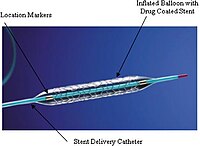
Photo from wikipedia
Background Percutaneous coronary intervention (PCI), the preferred coronary reperfusion strategy, induces endothelial trauma which may mount an inflammatory response. This has been shown to increase the likelihood of further major… Click to show full abstract
Background Percutaneous coronary intervention (PCI), the preferred coronary reperfusion strategy, induces endothelial trauma which may mount an inflammatory response. This has been shown to increase the likelihood of further major adverse cardiovascular events (MACE). Colchicine, a cheap and widely used anti-inflammatory has shown promise in improving cardiovascular outcomes. We aimed to perform a systematic review and meta-analysis to study the effects of colchicine in patients with symptomatic coronary artery disease (CAD) who have undergone PCI. Method We systematically reviewed and meta-analysed 7 randomised controlled trials including a total of 6660 patients (colchicine group: 3347, control group: 3313; mean age=60.9±10). Six studies included participants who had a ≤13.5-day history of acute coronary syndrome (ACS). One study included patients with both ACS and chronic coronary syndrome. The follow-up of studies ranged from 3 days to 22.6 months. Results The use of colchicine in patients who underwent PCI significantly reduced MACE outcomes (risk ratio 0.73 (95% CI 0.61 to 0.87); p=0.0003) with minimal heterogeneity across the analysis (I2=6%; P for Cochran Q=0.38). These results were driven mainly by the reduction in repeat vessel revascularisation, stroke and stent thrombosis. The number needed to treat to prevent one occurrence of MACE was 41. Conclusion Colchicine significantly reduced the risk of MACE in patients with CAD who underwent PCI, mostly in the reduction of repeat vessel revascularisation, stroke and stent thrombosis. The efficacy of colchicine should be further studied by distinguishing its use alongside different stent types and dosing regimens. PROSPERO registration number CRD42021245699.
Journal Title: Open Heart
Year Published: 2022
Link to full text (if available)
Share on Social Media: Sign Up to like & get
recommendations!